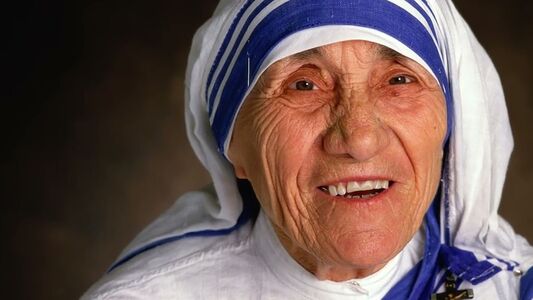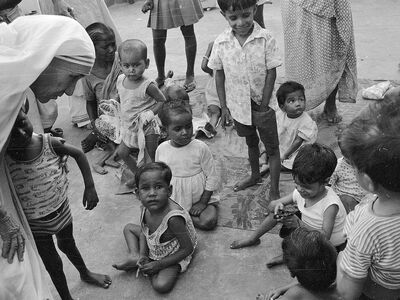My ancestral home at Taltala, Kolkata, is near Nirmala Shishu Bhavan (Mother Teresa's Home for the Children) and I have seen her closely. She was no different than the many sisters who went about their work in my locality, except that she was old and shriveled, but not infirm. In fact, if you went near her as she went about her work, you were bound to be asked for help. Carry the destitute from the rickshaw, hold the bag for the vegetables from the market. There was no dearth of work and, to be frank, not that I liked all of it.
To us in the vicinity she was an ordinary nun who had dedicated her life for the poor and for this alone she needed all our support. Whenever we were a nuisance at home my mother would cry, “If you have no work, go and help the sisters at Mother Teresa’s.”
And so, we did. The most common work attributed to us was to sit at the door and distribute wheat and soyabean oil to the poor, a gift from the people of America. That it was sold by them to the local grocer is another story.
There is a common misconception about Mother Teresa’s work – that she sold herself as a regular doctor. She did not. In fact, she was closer to a palliative nurse. Her early work lacked funds; the people she lifted from the gutter were beyond medical care. She offered companionship to the unloved who were dying.
Mother Teresa’s belief that suffering can be an act of Christian witness, that those who suffer have a kind of spiritual dignity, has been misunderstood as toleration of their pain – as if charity for the ill only counts if the consequence is cure. In fact, just accompanying a person through their final days can make a huge difference to their life.
Mother Teresa’s take on suffering has a particular meaning for me. When I was in college my father suffered from a cerebral stroke and was admitted to the Medical College and Hospital. My father died a few days later. During this time, I moved into the hospice and kept vigil by his bed. I ceased to be a son and became a nurse. I was there at 1 a.m., when he breathed his last.
I lifted his head gently to bring water to his lips, to offer the last drop of water to the dying, as they say in Hinduism. I held his fragile hand and mustered courage to recite the few lines I had managed to remember from the Bhagavad Gita, which my father himself had taught me.
In a rational sense, what I did was quite useless. But being there for someone as they die lets them know that they matter, and religious language articulates emotions that we often struggle to define.
The litany for the dying asks saints to pray for the terminally sick – it is a plea for mercy, for relief from suffering, for what we sometimes call 'a good death'. And it is a hopeful prayer that whatever comes next will be worth the struggle. Of course, my father would have preferred none of these or a miracle to bring him back to life. A miracle, in that context, is something desirable yet pitifully impossible. But it can happen.
We sometimes refer to against-the-odd victories in the struggle in our life as miracles. Birth is called a miracle. And the Catholic faith identifies as miracles things that defy all explanation beyond an act of God. Mother Teresa did not personally cure a Brazilian man of his multiple brain tumors. I believe that she interceded to ask God to do it.
Some non-Catholic Christians find this far-fetched. But once you have accepted that an Albanian nun went about the street in search of the dying to give them shelter, skepticism about sainthood and miracles seems, to me, at least, oddly fussy.
Indeed, I often ask myself, why, as an atheist in my earlier life I had devoted so much energy to tearing down something which I didn’t believe in and which, on balance, brings so great a comfort to others.
Let me tell you, even if Mother Teresa was flawed, her reputation has inspired wonders. Today there are thousands in her Missionaries of Charity in action, caring for abandoned children, those with HIV, lepers and the terminally ill. That someone is prepared to devote their life to help others is, in itself, a kind of miracle.
It is Mother Teresa’s lasting gift to the world.



